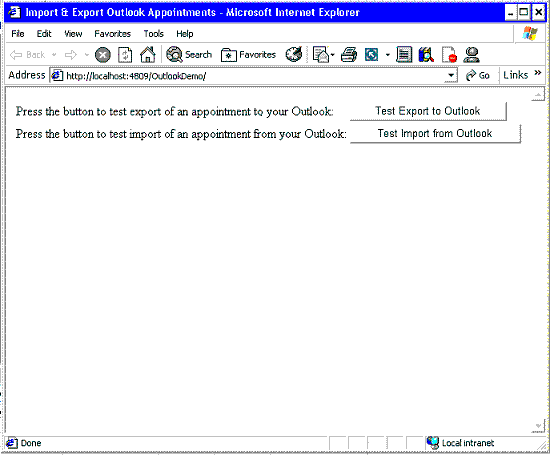
Introduction
This article illustrates an example of how to import and export appointments from an Outlook application installed on the client machine and a web-application on the server. The web application being hosted on the server, extraction of appointments can not be done on the server-side as every other user has his/her own list of appointments stored in their Outlook.
Background
I was working on a project that had a requirement to import and export appointments from an Outlook application: saving appointments on the client machine as per the client's choice, and porting appointments from Outlook appointments into the web-application. I tried to find help on the Internet for the same, but failed to find any article written on it.
Using the code
Since we need to extract the appointments on the client-side, we will be using an ActiveX object. Thus, we need to enable the setting to allow ActiveX scripts, as shown below (found under Security Settings of Internet Options):

Once an Outlook application is installed on the system and the security setting is done as per above, we are ready to import/export appointments.
var objOutlook = new ActiveXObject( "Outlook.Application" );
In the case of exporting: for the different items in Outlook, there are fixed item numbers, like:
var olAppointmentItem = 1;
var objAppointment = objOutlook.CreateItem(olAppointmentItem);
Now, the properties of this object can be set as per required and then saved.
objAppointment.Subject = "Appointment exported to Outlook from a web application";
.....
objAppointment.Duration = duration;
objAppointment.Save();
In the case of import: again, for the different items in Outlook, there are fixed item numbers, like:
var outlookFolderCalendar = 9;
We will get all the appointments after creating the MAPI namespace, and give the default folder name.
var objNameSpace = objOutlook.GetNamespace("MAPI");
var outlookFolder = objNameSpace.GetDefaultFolder(outlookFolderCalendar);
var myOutlookItems = outlookFolder.Items;
For example, I have to show the first appointment in the calendar. The different properties can be extracted like:
var dateOfAppointment = myOutlookItems(1).Start;
.....
var bodyOfAppointment = myOutlookItems(1).Body;
The extracted values of each appointment can now be used as per your needs. One thing to note is while extracting appointments from Outlook, we get a prompt like shown below:

We need to allow access in order to get the appointments from Outlook.
Points of Interest
Since I was using an ActiveX object, it was difficult getting the different property names required, as ActiveX objects cannot be debugged for quick-watch. It was fun and irritating at the same time to find all the properties required. Not to forget the case-sensitive nature of JavaScript!
History
First version.
